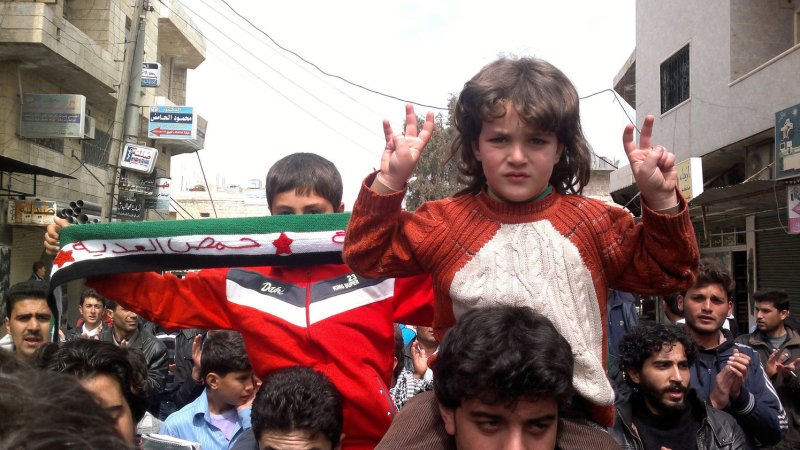Demonstrators gather during a protest against Syria's President Bashar al-Assad in Kafer Nabel near Adlib April 1, 2012. Turkey hosted a conference meeting of the Friends of Syria, a group of countries which seek an international agreement on how to end violence in Syria. According to UN estimations, the year-long onslaught of the Syrian regime has so far killed more than 8,000 people in the country. UPI. |
License Photo
UNITED NATIONS, April 3 (UPI) -- U.S., British and French envoys said they would seek Tuesday to hold Syria to its pledge to remove government troops from population centers by April 10.
The withdrawal of the security forces would pave the way for a general cease-fire, Kofi Annan, the joint special envoy of the United Nations and the Arab League, said.
The New York Times said many U.N. Security Council members have greeted Syria's pledge to withdraw troops with skepticism.
The U.S., British and French envoys have drafted a Security Council statement, to be circulated among the council's 15 members, warning of additional actions against Syria if the regime fails to comply with President Bashar Assad's pledge to halt the use of heavy weapons in residential areas and to withdraw forces from in and around major population centers by next week, the diplomats said.
Annan has called for the council to publicly endorse the April 10 deadline as a means of pressuring Syria to respect it, said diplomats who were in a closed-door briefing conducted with Annan from abroad by satellite, the Times reported.
Annan, a former U.N. secretary-general, also asked the Security Council to develop contingency plans to deploy U.N. observers to Syria in case the cease-fire happens, U.S. Ambassador to the United Nations Susan Rice told reporters.
It was impossible to know whether the regime had begun withdrawing forces because Syria has strictly limited the work of journalists in the country.
"We hope that the Syrian authorities will implement fully the commitments that they have made without any conditions," Rice, this month's Security Council president, told reporters after the meeting.
"And should they do so, we will expect the opposition to follow suit within 48 hours," she said.
"We have seen over the course of the last months promises made and promises broken," Rice said. "Past experience would lead us to be skeptical and to worry that over the next several days that, rather than a diminution of violence, we might yet again see an escalation of the violence."
The Syrian commitment, made by Syrian Foreign Minister Walid al-Moualem in a letter to Annan Sunday, came amid reports regime forces intensified bombardments of targets in the city of Homs.
The uprising, which began in March 2011, has left more than 9,000 people dead and thousands more wounded, the United Nations says.
Syrian U.N. Ambassador Bashar Jaafari told reporters outside the Security Council Monday Syria was committed to Annan's six-point plan, and "all the details will be part of the final commitment of everybody, not only the Syrian government."
Jakob Kellenberger, president of the International Committee of the Red Cross, arrived in Damascus Tuesday to press for a daily two-hour cease-fire to allow for the evacuation of the wounded.
''I am determined to see the ICRC and the Syrian Arab Red Crescent expand their presence, range and scope of activities to address the needs of vulnerable people," Kellenberger said in a statement released by the ICRC. "A daily pause in the hostilities is essential in order to evacuate wounded people and deliver aid if and when the fighting intensifies."
Assad's uncle, Rifaat Assad, told the BBC there is too much violence in the streets of Syria for his nephew to remain in power for much longer. Rifaat Assad has lived in exile since the 1980s, when he tried to seize power from his brother, former President Hafez Assad, in a coup. The BBC said Rifaat Assad, who now lives in Paris, considers himself the legitimate successor to Hafez Assad, who died in 2000.















